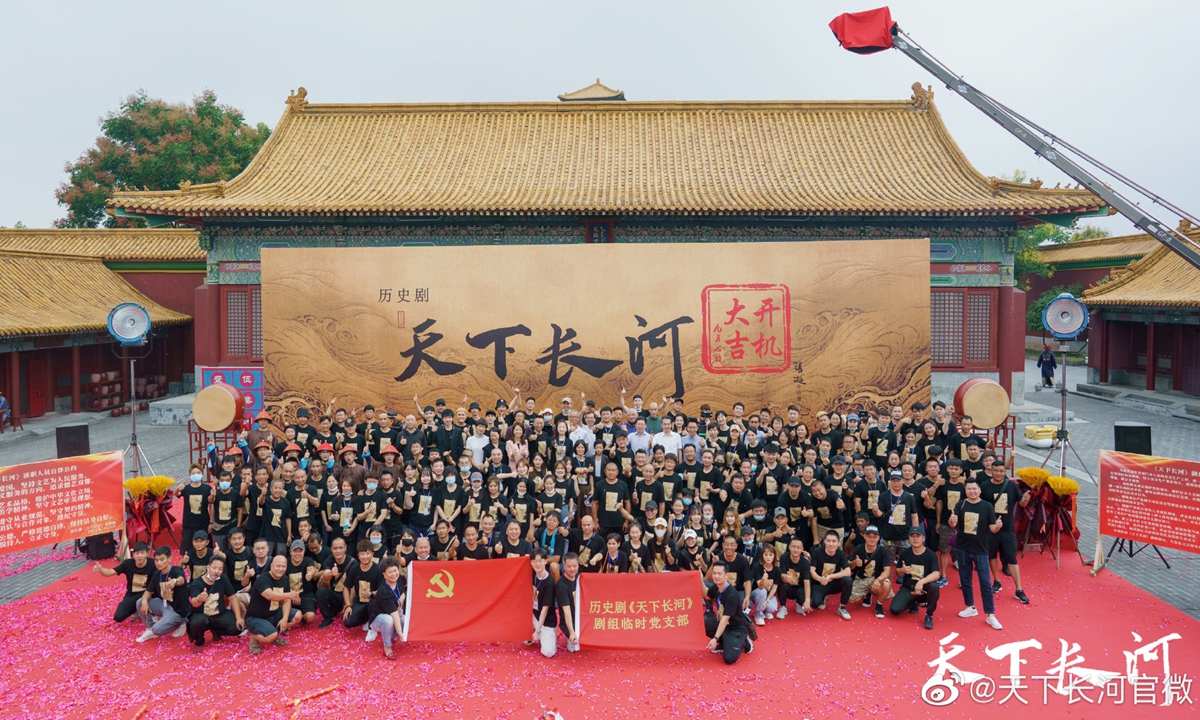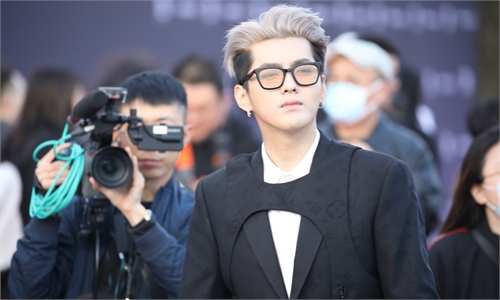Drama crew post code of behavior, set up temporary Party branch amid industry clean-up

Crew members of a new Chinese history drama Tianxia Changhe pose at the pre-production ceremony. Photo: account of drama crew on Sina Weibo
A new Chinese history drama crew set up a temporary Party branch and put up billboards showing a code of behavior for the crew members at its pre-production ceremony, an unprecedented practice that was hailed by some industry practitioners on Thursday as clearing the atmosphere amid the nation's tightening regulations on the entertainment industry.
The drama Tianxia Changhe, which means "long river under the sky" in Chinese, released photos of the ceremony on Chinese social media platform Sina Weibo, showing crew members posing in front of a billboard holding a Party flag and a flag reading "Tianxia Changhe crew temporary Party branch." Two billboards detailing a code of conduct for crew members stood on both sides.
A screenwriter told the Global Times on Thursday that traditionally, crew members would hold a worship ceremony with tributes like meat and fruit before filming starts. The time and location of the ceremony were often carefully picked.
"The ceremony is very similar to worshipping ancestors and the purpose is to pray for good luck for the film or drama," the screenwriter said.
Shi Wenxue, a film and TV critic, told the Global Times that setting up a temporary Party branch is an unprecedented practice for a production team that has highly mobile staff.
The Constitution of the Communist Party of China (CPC) stipulates that any organization that has three or more Party members can set up basic-level Party branches. Temporary organizations can set up temporary Party branches.
The threshold of three Party members can be met by any production team, but the highly commercial sector has long forgotten the practice, Shi said.
If Party members are in all sectors and Party members can hold political activities regardless of their occupations, there is no reason to make entertainment an exception, an internet user commented on the ceremony.
China's Ministry of Culture and Tourism on Thursday held a meeting to highlight the enhancement of management over cultural and entertainment sector. The ministry announced plans to strengthen ideological and political guidance, establish regular training mechanisms, and carry out training for personnel in the sector. Also, it plans to select a group of outstanding art workers to promote positive atmosphere, and improve the supervision system in the sector.
On Tuesday, the National Radio and Television Administration held a symposium asking all industry practitioners to love the Party and the nation, abide by laws and moral codes, cast aside money warship and extravagance, and make artistic works that can stand the test of time.
Those requirements are normal, but observers noted that the entertainment sector has long been perceived as lacking effective supervision and regulation.
That was shown in the case of actress Zheng Shuang, who was ordered to pay 299 million yuan ($46 million) in fines, taxes and penalties for tax evasion.
The changes come as China tightens its regulations on the entertainment sector, especially after scandals such as Zheng Shuang's tax evasion and the arrest of Chinese-Canadian pop star Kris Wu on suspicion of rape.
China also enhanced rectification with specific measures over the sick parts of "fan circle" culture in the entertainment industry, tackling the long-controversial moves by teenage fans that blindly idolize celebrities and excessively spend money on their "idols.".
Actor He Zhilong told the Global Times that the latest actions would affect liuliang entertainers, whose popularity is based on fans' irrational support, the most.
"With a purer environment, we can dedicate ourselves to artistic creation," He said.


